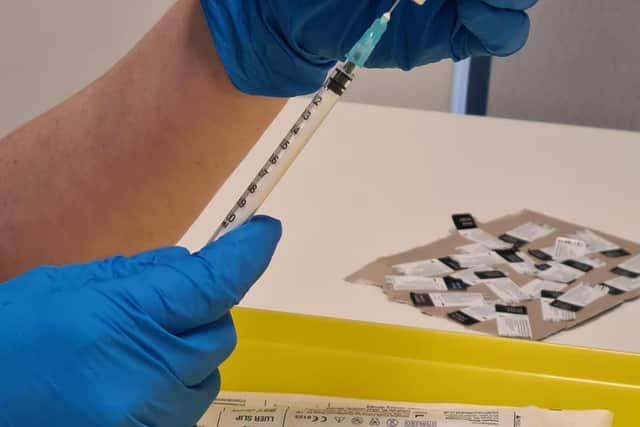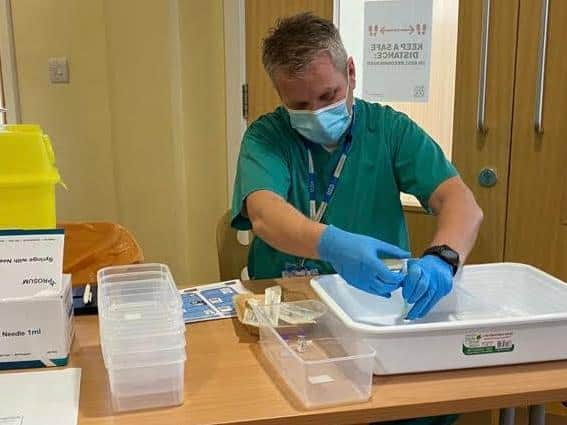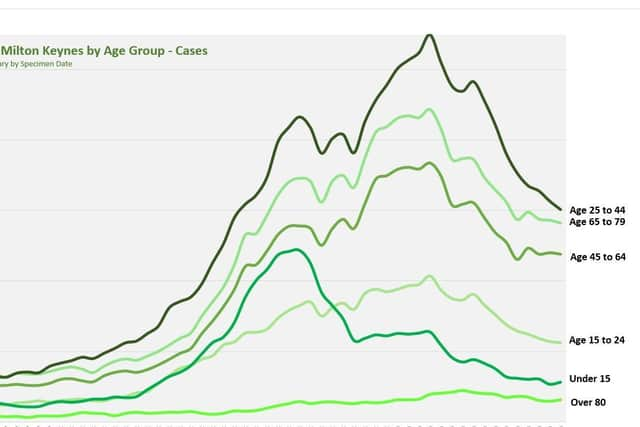Total number of Covid-related deaths in Milton Keynes revealed as UK reaches grim milestone but up to 3,000 people a DAY are being vaccinated as infection rate finally plummets
and live on Freeview channel 276
Just two weeks ago, Milton Keynes' Covid rate topped 1,000 cases per 100,000 people. Today it stands 498.4 per 100,000.
While this is still higher than the England average of 403.9, it is a decrease that has delighted city health officials.
Advertisement
Hide AdAdvertisement
Hide AdAfter weeks of seeing up to 400 new cases a day, the number of MK positive tests have also more than halved over the past 10 days. Tuesday's figure was 47 - the lowest for many weeks.


Sadly, MK's death rate is still the national spike. Over the past week there have been 39 deaths, bringing the city's toll to 369 since the start of the pandemic. Meanwhile 170 Covid patients remain in MK hospital, seven of them on ventilation.
However, the best news is that up to 3,000 people a day are now receiving Covid jabs at seven vaccination centres in Milton Keynes.
The latest data, accurate up until January 17, shows more than 47,000 people have received their first doses in Milton Keynes, Bedfordshire and Luton NHS area. Of these, 22,259 were carried out on people aged under 80, including frontline workers and care workers, and 22,292 were received by people aged over 80.
Advertisement
Hide AdAdvertisement
Hide AdJust over 4,000 of the over 80s and 624 under 80s have also had their second dose of the vaccine.


MK's Covid vaccination centres are working so efficiently, seven days a week, that many have almost completed their list of patients aged over 80.
By this weekend, doctors confidently predict that every resident and staff member in every care home in Milton Keynes will have received their jabs.
By next week, of the city's population of over 80s should have received their first jabs, which will give them immunity for many weeks.
Advertisement
Hide AdAdvertisement
Hide AdSome of the city's vaccination centres have already their lists of over 80s and moving on to the next priority groups - people aged 75 and over and the extremely clinically vulnerable. Some centre are even ready to offer jabs to the fourth priority groups - the over 70s and the clinically vulnerable.


There are seven MK vaccination hubs, each comprising a Primary Care Network of a cluster of GP surgeries. These are at Whaddon and Water Eaton health centres in Bletchley, Westcroft health centre, Newport Pagnell Medical Centre, CMK Medical Centre (on Bradwell Common), Whitehouse health centre, Oakridge Park Medical Centre and Asplands in Woburn Sands.
Very soon, to speed up the city's programme even further, a new mass vaccination centre will open at Saxon Court, the council's former housing offices, in Central Milton Keynes.
The Citizen spoke to Dr Omotayo Kofeji, a GP at Newport Pagnell Medical Centre, to discover what it was like at the vaccination frontline.
Advertisement
Hide AdAdvertisement
Hide Ad"It's pretty hectic and very, very full one," he said. "We opened on Saturday with seven teams working between 10am and 6.30pm. On Sunday we worked from 8.30am to 6.30pm and weekdays we're running between 8am and 6.30pm.
The Newport Centre is giving between 300 and 400 vaccines a day. Other centres, depending on their size, are giving slightly more of less but between them they are thought to be averaging up to 3,000 shots a day.
"Staff and volunteers from all the surgeries are helping and everybody is keen to get it done", said Dr Kofeji. "There's so many people involved in making this work and planning this. It's a national crisis, therefore we will all do as much as we can to help."
Meanwhile, he said, GPs are still running their routine surgeries and phone consultations with sick patients.
Advertisement
Hide AdAdvertisement
Hide AdBut, despite the pressure, the atmosphere is often cheery as the vast majority of people are enthusiastic and grateful to get their jabs. For the staff and volunteers though, it can be a tense race against time behind the scenes of the socially distanced queues to ensure the vials of precious vaccine are properly prepared.
Currently the centres are using stocks of the Pfizer vaccine, which has to be stored at extreme temperatures and defrosted. Each vaccine has to be diluted with a saline solution then carefully shaken precisely 10 times - a laborious but crucial task often carried out by pharmacy volunteers.
The vial contains five doses but doctors quickly discovered that, with careful preparation, there is actually enough for six doses. The shelf life of the vaccine, once prepared and ready to inject, is a frustratingly short two or three hours. Sometimes, said Dr Kofeji, a dose or two is left at the end of the day, when the queue of satisfied patients has finally disappeared,
Determined not to waste a precious drop, each centre has prepared a special 'last minute list' with names and contact numbers for people next in the priority system who could be offered a jab at literally a few minutes' notice. These could be healthcare workers, people over 70 or people who are clinically vulnerable.
Advertisement
Hide AdAdvertisement
Hide Ad"The Pfizer vaccine is so delicate that everything has to run like clockwork. It can be a race against time. But we would never throw away a drop," said Dr Kofeji. "The AstraZeneca Vaccine is much easier and we tend to use that to take out of care homes to vaccinate people there."
Newport Pagnell centre has proudly ticked off all its care homes and most of the over 80s from its Covid jab list. Soon it will be moving on to the other priority groups.
"People need not panic, their turn will come. They do not need to ring their surgery and chase their vaccine as this just blocks the lines for everyone. They will get a letter or a call," said Dr Kofeji.
Most importantly he is urging people, when their time comes, not to arrive EARLY for their vaccine appointment.
"It can cause so many problems with managing queues and trying to avoid congestion and keep people safe. We are asking people to come on time - but please don't be early."